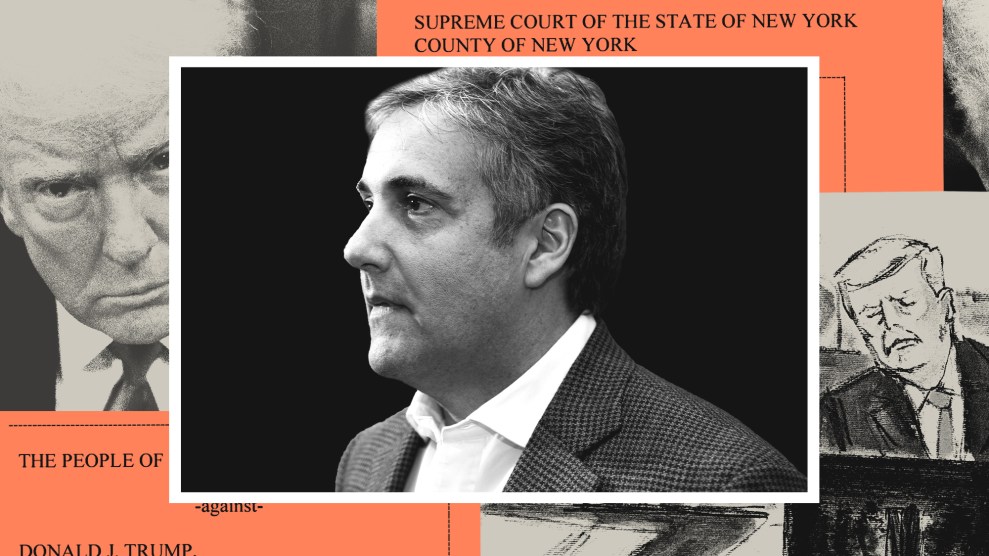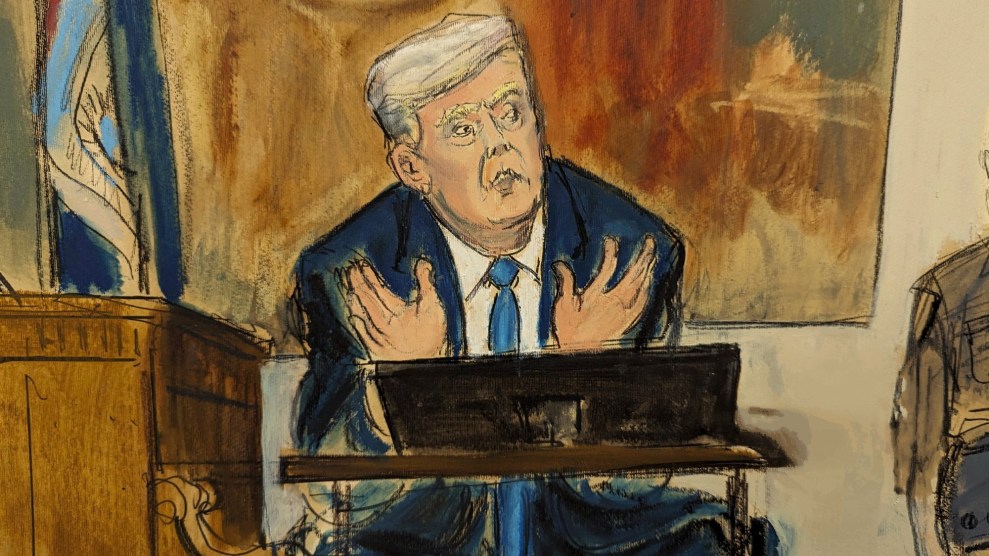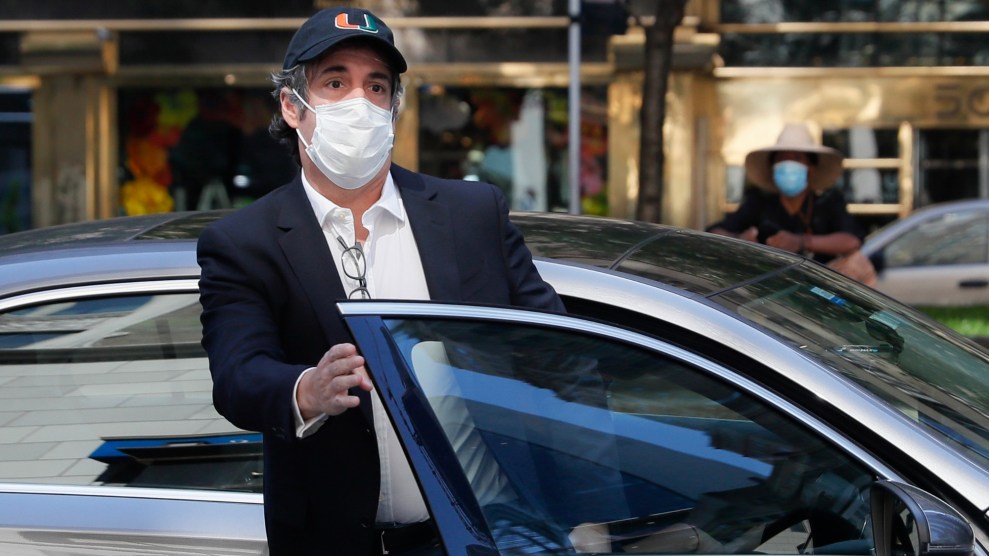
Mother Jones; Yuki Iwamura/AP; Imago/ZUMA; Elizabeth Williams/AP
Former President Donald Trump faced off with his onetime fixer Michael Cohen in court on Monday, and for the most part, Cohen delivered a persuasive indictment. Even though the two men have had an openly antagonistic relationship for years, Trump appeared to be very performatively ignoring his former attorney, as Cohen methodically testified about Trump’s close involvement with a scheme to cover up his alleged extra-marital affairs, including one with adult film star Stormy Daniels, in the runup to the 2016 election.
Cohen took the stand on Monday in the criminal trial against Trump in Manhattan, accusing Trump of more than 30 counts of filing false business documents concerning the cover-up scheme. It’s the fourth trial that Trump has faced in just over a year—two defamation cases filed by writer E. Jean Carroll and a financial fraud case filed by the state of New York. Trump did not attend the first Carroll case but continually threatened to. During both other cases, he often behaved poorly in court, expressively waving his arms, talking noisily to his attorneys, laughing derisively, cursing, being disciplined by the judges, and sometimes storming out. So far in this criminal trial, Trump has been relatively subdued, often genuinely appearing to doze off, but mostly sitting with his eyes closed. During last week’s testimony, he appeared to mutter “bullshit” while Daniels testified and was scolded by the judge.
During Monday’s testimony, Trump seemed determined to show that he did not care about Cohen’s appearance in court. When Cohen entered the courtroom, all eyes were on him making his way to the witness stand, but Trump sat petulantly looking in the other direction. For most of Cohen’s morning testimony, Trump sat silently, with his eyes closed, but occasionally looked up, rolling his eyes and whispering to his attorneys. After a morning break, Trump sat down with a large stack of papers—possibly news clippings his staff printed out for him—and began leafing through them.
Cohen appeared tired and nervous but quickly settled into his testimony. Because of the courtroom setup, neither man could see the other. When asked to identify Trump as the defendant, Cohen had to stand in the witness box and crane his head to spot him.
Cohen’s testimony was straightforward, and he came across as meek and polite—a stark contrast to his often abrasive persona on television, his Mea Culpa podcast, or his new TikTok account. Cohen’s testimony may become more complicated when Trump’s defense team has an opportunity to cross-examine him—during the fraud trial that centered on Trump lying to banks and insurance companies about his net worth, Cohen was easily flustered and had engaged in shouting matches with Trump’s attorneys. Today, on direct examination, Cohen’s message was very specific and concise: he had helped set up payments to kill the release of negative stories about Trump, in response to the direct request of Donald Trump.
His testimony was not restricted to the hush money payments to Stormy Daniels alone. When a former Trump Organization doorman threatened to go public with a story that Trump had a love child with a woman in the building, Cohen says Trump told him, “You handle it.” Trump was pleased, Cohen testified, when he was told that the doorman had been paid $30,000 not to go public. Cohen added that Trump gave him similar instructions when, in the weeks before the 2016 election, the campaign received word that Stormy Daniels and another woman, Karen MacDougal, a former Playboy Playmate, were possibly ready to go public with stories they had had affairs with Trump.
“Just do it,” Cohen testified Trump told him in October 2016, when they were discussing whether Trump would pay Daniels $130,000 to keep her story quiet. Cohen eventually paid the $130,000 himself but was later reimbursed by Trump, who subsequently claimed the payments were legal bills, not reimbursements.
Trump has continued to insist that Daniels and the others were trying to extort him. The prosecution must prove that Trump made these payments for political reasons. Bragg must show that the lies about the payments were done in service of a campaign finance crime; hiding the payments was explicitly planned by Trump to help his campaign. According to Cohen, when Trump was told that Daniels’ story might become public, he was livid.
“This is is a disaster, a total disaster,” Cohen testified Trump said to him. “This is really a disaster. Women are going to hate me, guys may think it’s cool, but this is going to be a disaster for the campaign.”
Cohen said he also asked Trump how his wife, Melania Trump, would handle the story of an affair between Trump and Daniels. Even as he has denied making the payments, Trump has insisted that any efforts were not politically motivated but to protect his wife who had just given birth to their son Barron at the time of the affair. Cohen said Trump was dismissive of his wife.
“Don’t worry, how long do you think I’ll be on the market for? Not long,” Cohen said Trump told him. “He wasn’t thinking about Melania, this was all about the campaign.”
Cohen’s story about Melania elicited a rare reaction from Trump; he shook his head while Cohen spoke.
Cohen will return to the stand tomorrow where he likely will face a brutal cross-examination from Trump’s attorneys. Cohen served a year in federal prison for lying to Congress under oath—though notably, lying on behalf of Trump, which he now openly admits he did. This makes Cohen vulnerable to being attacked for his lack of credibility as well as his demeanor. For years, before turning against Trump, Cohen was known as a snarling, vitriolic defender of his boss, who didn’t hesitate to call journalists who wrote negative stories about Trump and scream at them while making various threats. Prosecutors have attempted to head off the onslaught of attacks under cross-examination by asking previous witnesses to share their opinions of Cohen, which have almost universally been negative. Under direct examination by prosecutors, one witness, Keith Davidson, an attorney for Stormy Daniels, said Cohen was “kind of a jerk” and said he went out of his way to avoid dealing with him.


















